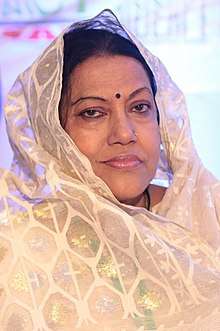Farida Parveen
Farida Parveen (born 31 December 1954)[1] is a Bangladeshi folk singer. Referred to as "the Queen of Lalon song,"[2] she received Ekushey Padak in 1987[3] and Bangladesh National Film Award for Best Female Playback Singer for the film Andho Prem (1993) in 1993.[4]
Farida Parveen | |
|---|---|
 | |
| Background information | |
| Born | 31 December 1954 |
| Origin | Natore District, East Bengal, Dominion of Pakistan(now Bangladesh) |
| Genres | Lalon, folk |
| Occupation(s) | singer |
| Instruments | instrumental, vocal |
| Years active | 1968-present |
Early life
Parveen was born in Natore and was brought up in Kushtia. Her father worked in the health service. As a child she used to play a harmonium.[5] In 1968, she was enlisted with Rajshahi Betar as a Nazrul singer.[6] She graduated from Kushtia Government College under Rajshahi University.[7]
Parveen first took lesson from Komal Chakrabarti. Later on, she received lessons in classical music from Ustaad Ibrahim Khan, Ustad Rabindranath Ray, Ustad Osman Goni and Ustad Motaleb Biswas. She then learnt Nazrul songs from Ustad Mir Muzaffar Ali and Ustad Abdul Qadir. She was introduced to Lalon music by Moksed Ali Shai.[8]
Career
Parveen started her career with Nazrul Geeti. In 1973, she performed the patriotic song Ei Padma Ei Meghna and the Lalon song Shatyo Bol Shupothey Chol. Her other songs are Tomra Bhulei Gechho Mallikadir Naam, Nindar Kanta Jodi and several Lalon classics. She sings mostly Lalon songs.[9] In 2014, she performed in a sufi festival organized by Bangladesh embassy and the Centre for Fine Arts in Belgium.[10] In 2015, she performed in New Delhi at an program organized by Bangladesh High commission on Pohela Boishakh.[11]
Works
Songs
- "Ei Padma Ei Meghna"
- "Barir Kache Arshi Nogor"
- "Shatyo Bol Shupothey Chol"
- "Tomra Bhulei Gechho Mallikader Naam"
- "Nindar Kata Jodi"
- "Porga Namaz Jene Shune"
Albums
- Khachar Vitor Ochin Pakhi
- Kishoree Bou
- Milon Hobe Koto Dine
- Nindar Kata
- Pap Punner Kotha
- Shomoi Gele Shodhan Hobena
- Tomra Vule Gacho
Awards
- Feroza Begum Memorial Gold Medal (2019)
- Fukuoka Asian Culture Prize (2008)
- Bangladesh National Film Award for Best Female Playback Singer (1993)[12]
- Ekushey Padak (1987)
- Anannya Top Ten Awards (2008)
References
- "Farida Parveen [ Arts and Culture Prize 2008 ]". Fukuoka. Retrieved 11 November 2015.
- "THROUGH THE EYES OF FARIDA PARVEEN". The Daily Star. 2017-12-02. Retrieved 2018-12-17.
Farida Parveen is an indistinguishable name in the Bangladeshi folk music arena. Known as the Queen of Lalon songs, she was born at 31st December, 1954 in Natore, Bangladesh and was brought up in Kushtia.
- একুশে পদকপ্রাপ্ত সুধীবৃন্দ [Ekushey Padak winners list] (in Bengali). Government of Bangladesh. Retrieved 23 August 2017.
- "জাতীয় চলচ্চিত্র পুরস্কার প্রাপ্তদের নামের তালিকা (১৯৭৫-২০১২)" [List of the winners of National Film Awards (1975-2012)]. Government of Bangladesh (in Bengali). Bangladesh Film Development Corporation. Retrieved 25 March 2019.
- Ghosh, Avijit. "Music knows no borders, says Bangladesh singer Farida Parveen". Times of India. Bennett, Coleman & Co. Ltd. Retrieved 10 July 2015.
- Ershad Kamol (27 July 2005). "Lalon singer Farida Parveen is a class apart". The Daily Star. Retrieved 24 June 2012.
- 'অচিনপাখি': ফরিদা পারভীন. Glitz (in Bengali). bdnews24.com. Retrieved 24 January 2013.
- "Through the eyes of Farida Parveen". The Daily Star. 2017-12-02. Retrieved 2017-12-09.
- "Farida Parveen to perform at IGCC". The Daily Star. Retrieved 10 July 2015.
- "'Sufi Night' in Belgium". The Daily Star. Retrieved 10 July 2015.
- Bhattacharya, Pallab. "Naboborsho in Delhi". The Daily Star. Retrieved 11 November 2015.
- "An evening of Lalon song with Farida Parveen". Dhaka Tribune. Retrieved 11 November 2015.